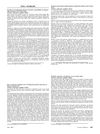Search
for
Sort by
Research
840-870 / 1000+ results
research Autoimmunity in Satoyoshi Disease: A Systematic Review
Satoyoshi syndrome is likely an autoimmune disease that mainly affects young women and improves with immune-related treatments.

research Alopecia Areata in a 45-Year-Old Female with Autoimmune Diseases
A 45-year-old woman with autoimmune diseases experienced patchy hair loss due to alopecia areata, which has no cure but can be treated, with varying success.

research Alopecia Areata: An Autoimmune Disease Causing Hair Loss
Alopecia Areata is an autoimmune condition causing hair loss with no cure and treatments that often don't work well.

research Alopecia Areata: Overview and Insights from January 2018
Alopecia areata is an autoimmune condition causing hair loss, influenced by genetics, stress, and diet, and may be prevented by a high soy oil diet.

research Alopecia Areata: A Review of Disease Pathogenesis
Alopecia areata is likely an autoimmune disease with unclear triggers, involving various immune cells and molecules, and currently has no cure.

research Epidemiology and Burden of Alopecia Areata: A Systematic Review
Alopecia areata is a common autoimmune disease affecting about 2% of people, causing significant disability and often associated with mental health issues and other autoimmune conditions.
research Controlled Delivery of T-box21 Small Interfering RNA Ameliorates Autoimmune Alopecia in a C3H/HeJ Mouse Model
Controlled delivery of specific RNA and IL-4 restored hair growth in mice with autoimmune alopecia.

research Alopecia Areata: An Update
The document concludes that alopecia areata is an autoimmune disease without a definitive cure, but treatments like corticosteroids are commonly used.
research Resident Memory T Cells in Autoimmune Skin Diseases
Certain immune cells contribute to skin autoimmune diseases, and some treatments can reverse hair loss in these conditions.

research Alopecia Areata: Diagnosis and Management
Alopecia areata is an unpredictable autoimmune hair loss condition, treated based on severity, with half of patients regrowing hair within a year without treatment.

research Alopecia Areata: Current Situation and Perspectives
Alopecia Areata is a complex, unpredictable autoimmune hair loss condition with limited treatment options and a significant psychological impact.
research Cytokine Targeted Therapeutics for Alopecia Areata: Lessons from Atopic Dermatitis and Other Inflammatory Skin Diseases
Targeted cytokine treatments may help with alopecia areata, but more research is needed.

research Immunology of Alopecia Areata
Alopecia areata, a type of hair loss, is likely an autoimmune disease with a genetic link, but its exact cause is still unknown.

research Alopecia in Children: The Most Common Causes
The four main causes of hair loss in children are fungal infections, pulling out hair, autoimmune hair loss, and stress-related hair shedding.
research Clinical Features of Vitiligo Associated with Comorbid Autoimmune Disease: A Prospective Survey
Vitiligo patients should be routinely screened for thyroid disease and, if extensive or prolonged, also for RA, PA, and type 2 diabetes.
research Prevalence and Risk Factors Associated with the Occurrence of Autoimmune Diseases in Patients with Alopecia Areata
Alopecia areata patients, especially women with nail issues or atopic diseases, are at higher risk for other autoimmune diseases.

research Perforin Expression by Cutaneous Gamma Delta T Cells
Gamma delta T cells in the skin help with healing and defense but can also cause autoimmune issues, and more research is needed to understand how they are activated.

research Alopecia Universalis Following Two Sequential Traffic Accidents: Possible Association with Increased Th1 and Th17 Cells and Decreased Th2 Cells
Autoimmune hair loss may be linked to increased Th1 and Th17 cells and decreased Th2 cells.
research Psychological Stress-Induced Pathogenesis of Alopecia Areata: Autoimmune and Apoptotic Pathways
Stress may contribute to hair loss in alopecia areata by affecting immune responses and cell death in hair follicles.

research Alopecia Areata Universalis Precipitated by SARS-CoV-2 Vaccine: A Case Report and Narrative Review
The SARS-CoV-2 vaccine may be linked to triggering autoimmune conditions like Alopecia Areata.

research Alopecia Areata and Alopecia Areata Incognita
Alopecia Areata is an autoimmune hair loss condition, with various treatments showing mixed effectiveness and no guaranteed cure.

research Alopecia Areata: Comprehensive Overview and Management
The document concludes that alopecia areata is an unpredictable autoimmune hair loss condition with no cure, but various treatments exist that require personalized approaches.

research ABC of Dermatology: Diseases of the Hair and Scalp
The document explains different hair and scalp conditions, including common hair loss after pregnancy or illness, drug-induced hair loss, hereditary excessive hair growth, patterned baldness, autoimmune hair loss, and permanent loss due to skin disease, with generally limited treatment options.
research Radiation Dermatitis: Radiation-Induced Effects on the Structural and Immunological Barrier Function of the Epidermis
Radiation therapy damages skin structure and immune function, causing inflammation and potential hair loss.

research Vitamin D Levels in Patients With Seborrheic Dermatitis
People with seborrheic dermatitis often have lower vitamin D levels.

research Alopecia Areata: Multifactorial Disease Involving Genetic, Environmental, and Autoimmune Factors
Alopecia areata is a complex condition causing hair loss, linked to genetics and immune system issues, and may be related to other autoimmune diseases; treatments vary in effectiveness.

research Alopecia Areata: An Autoimmune Hair Loss Condition
Alopecia Areata is an unpredictable autoimmune hair loss condition with limited and variable treatment effectiveness.

research Psoriasis and Psoriatic Arthritis Patient Productivity Burden in the United States
Psoriasis patients have more comorbidities, including autoimmune diseases and other health issues, than those without psoriasis.

research Case Report: Sequential Therapy with Dupilumab and Baricitinib for Severe Alopecia Areata with Atopic Dermatitis in Children
Sequential therapy with dupilumab and baricitinib improved hair regrowth and atopic dermatitis in a child without adverse reactions.